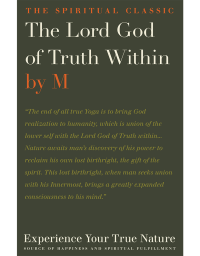In order to get behind the screen of nature and discover what is back of the flower and back of the plant, the Yogi taps the higher kingdoms of the devas and in their vibration and consciousness he learns the cause of things. As he enters the realm of intuition, he gains the realization of truth and beauty and knows his place and plan in nature’s manifestation.
These devas, or higher elemental beings, show the student the crucible of nature. They show him the creation of man from the beginning, and what takes place in elemental nature up to the time it is ushered into the physical world. It is from these higher beings that the Yogi obtains the knowledge of phenomena and is taught to obey the law of these planes of being.
Man little realizes how much of the elements are within himself; how his thoughts are seized upon by the elemental nature within him, and seemingly ensouled. Thus man acquires the character of his own mentality. He has both a physical and an elemental mind, with which he must familiarize himself and, when he becomes acquainted with the powers of his own elemental nature, he becomes a magician and miracle worker. Ignorant of his own creations, man tries by illegal methods to stop nature’s process of creation. An expectant mother considering a miscarriage or abortion, should realize that she carries around in her atmosphere a human intelligence, a half-human, half-elemental child, who derives nourishment from the life stream which flows through her. If she is a sensitive, she often becomes entranced by these half-human children, who remain beside her sometimes as long as twelve years.
Such children can intermittently see our world through the eyes of a sensitive, and the education of these spirit children is three times as rapid as of those born in the ordinary way. Such entities often control and entrance their mothers. For instance, a friend who is often entranced by her guide (so-called) will sometimes go into a shop. She buys some article, and when it arrives at her house, she will always find a red thread, which she is unconscious of ever having perceived. I have spent hours with her family, and whenever I appeared I was greeted by the voice of a small child, who did not leave her mother’s body until just before my departure. If you have the vision, you can communicate with these children. You learn to love them, for they will come to you whenever the mother is near you, and will ask for help. They like parties of children and often bring with them their little friends who are often as mischievous and troublesome as those in actual life.
The Yogi is often asked by his teacher to minister to a soul in its mother’s womb, in order to give it courage, strength, and love; this to prostitutes, as well as to more fortunate mothers. In The Dayspring of Youth—(Yoga Practice Adapted for Western Minds), we have spoken of the “white atom” of the heart, and also the “Secret Enemy,” or black atom at the base of the spine, the seats of the two natures in man. Each man is a magnet and attracts into his own atmosphere those conditions which are of the nature of his being. Man attracts that which he seeks, and that on which he places his mind unknowingly forms the nature of his own elemental being.
If we read the criminal records and the confessions of many murderers, we find that two or more intelligences dominated the man. One of these plunged his mind into its own consciousness of hatred and anger toward the world. It thus caused the poor sensitive to commit some crime, often leaving him with a blank consciousness, but with the fear of the law in his heart.
In the sub-human world the criminal classes are a division set apart, for generally they are rejected by the group souls in the animal world as being unsuitable in their present environment. They therefore seek by every means possible to reincarnate into the human kingdom, but generally their lower nature prevails and they war against society, in an effort to find an easy way to gratify their passions and desires.
The advanced souls leave beautiful things behind them in our world, which ennoble our minds and hearts. If we look at a beautiful piece of Chinese porcelain, we do much to discourage the onslaughts of discordant minds, for the alliance of beauty and truth is a protective force. This also applies to literature. It is always a good thing to have in our vicinity something which our hearts can recognize as beauty, for it will intensify in our minds the search for beauty in everyone we meet. It will start our imagination to work, which is the instrument the soul uses to make us aspire for higher things.
There is a secret mystery understood among the Asiatics and Yogis concerning the existence of a plane of consciousness which gives one control over the human mind. On this plane of consciousness the mind functions from a central fixed point of attraction and this gives a man the power to hold the lower mind in abeyance.
This realm is the sphere of the unformed consciousness in which the higher types of the devas reside, and here man is assisted to concentrate with fixed purpose upon one thing. It is as though an arrow which, when shot, had its limits of projection, was seized upon and carried forward into a consciousness of Truth.
Thus there comes a time during meditation and concentration when our fixity of purpose is increased and taken into another dimensional side of nature. The sensation is similar to stepping into another world of creation in which the mind is held true to the point upon which we meditate or aspire. This quality can be best summed up as fixity of purpose. Here the deva creations make their appearance and assume shapes often familiar to us in Chinese and Buddhistic paintings. We are also connected with a living chain of ancient teachers, who had gained realization of this sphere of the deva creation.
In Yoga we pass through the different dimensions, as we know them, and approach the subject from the background; namely, from that which is behind the thing we meditate upon. For instance, if we think of love or of war, and try to analyze our thoughts, we must approach and enter the consciousness behind. For example, the consciousness of the mother is behind the child and we approach the child consciousness by becoming immersed in the mother activities, which caused its creation.
The first teaching that comes from nature is to stand alone. Do not depend upon the assistance of others for your well-being, and do not depart from the original plan and purpose for which you came into an earthly body. Before a man incarnates, his higher self, the Lord God of Truth within, gives him the plan of his mission, and he is generally given choice of three ways of carrying out the plan. He is shown that it is possible to carry out the entire plan in a single life, but if he wishes to incarnate in the lap of riches his progress will be slow, and it will take him more lives than one. He discovers that his plan is to gain a certain range of experience, and that from this range of experience he will gain a greater wisdom knowledge. It might even be called Wisdom Teaching, because it is the result of his own personal experience before his plunge into matter. He must decide the course which he will take. The more advanced soul desires to gain his wisdom as quickly as possible. This plunges him through a range of experience which usually brings with it suffering and exertion. The wise man, whom we meet on earth today, has passed through a greater range of experience than his fellows; he is learned in the ways of mankind through actual experience, and he learns to see and feel as his fellows see and feel.
Man is happy only when he is carrying out the plan for which he incarnated and the gaining of this experience gives him a “round consciousness,” which brings him no sense of separateness from his fellows. The unhappy man is he who cannot carry out his desire to do this or that. I once met an old gentleman, eighty-two years of age, who impressed me as being exceedingly happy, and radiant with good will towards his fellows. He was attending a class for piano tuning and I asked him why, at his age, he was engaged in that work. He replied, “All my life I have had one desire, to learn to tune instruments, but I have had to work for others, and have been a slave. Now, at last I am free to carry out my early desires, and I am learning much from the vibration of these chords. All my life I have been out of tune. Now I am getting into it, not only with myself, but with others, and I am just beginning to feel alive. I am also beginning to be truthful to myself for the first time, and I understand now what Plato said regarding music.”
The second principle of nature is that of honesty, honesty of purpose and honesty of mind. To be really honest is to acquire right direction and truth through nature’s instruction.
The Yoga student, in first becoming acquainted with the elements, is taught by a sylph and, before he is taken into their consciousness he is asked not to break their laws, or interfere with their state of government. He is also taught the care of his physical body, for the human odor and general atmosphere is most obnoxious to the higher elemental beings of the air. His mind is also subjected to their system of analysis to determine his honesty of purpose. The gnomes, like the human beings of earth, dislike ridicule of any kind, and measure your attitude toward them by a quick glance in your direction.
The student is first given instruction regarding his form and nature before he came on earth. He witnesses the powers of creation and sees how a human being is built up and instructed in the womb of its mother, long before it takes earthly form. The plan and purpose of his present incarnation is also shown, and then the part which he did not fulfill in his former incarnation. As he contemplates these omissions he may perhaps ask the sylph teacher what Shakespeare left out of his works, and he will be instructed in subjects of Shakespeare’s past experience which he never dwelt upon. This brings a new fact to the student’s consciousness and a new vision of man’s achievement. He comes to realize the plan, and the part nature plays in man’s incarnation and in his evolution.
In the finer worlds the student is at one with nature’s intelligence, according to his degree of development. Here he discovers that nature grades him according to his devotion to Truth. She demands, “Honesty above all things.”
It is falsity in our natures which constantly endangers us. Like school children we must work through the different grades of nature’s teaching. By our mundane education we are supposed to be fitting ourselves to earn a living and take up our position in society. Also, we must aspire for the instruction of nature, in order that her cloak of protection may encircle us, and that we may gain the wisdom of our Lord God of Truth within.
This is a process of retiring inwardly to bring us into the higher realms of consciousness, and it is only by aspiration that we can approach the knowledge and wisdom of the laws of nature. We have within us our wisdom records of nature’s experiences, besides the records of our human experiences in former incarnations, but it is only when we seek to unite ourselves with Truth that we begin to regain our place in nature.
The third principle of nature—to be of service—has a double meaning. In order to be of service we must seek to become an instrument of the Lord God of Truth within. In serving humanity we serve the presence whose “spark” is in the mind of all things. Thoughts which are beneficent and helpful to our fellow beings link us with them through all eternity, but the result of this linking brings us sadness. We experience compassion, or a desire to serve our weaker brothers. People often wonder what is the difference between a holy man and a saint, but if we think deeply we find that a saint is a miracle worker, who has the power to answer the prayers of humanity. Some consider that saints belong only to the remote past, yet in our day and time there are many saints, who have the divine note of nature within them and who, having gained God Realization (understanding the laws underlying nature’s consciousness), no longer use “personal will,” but the will of nature—God. By this means they have unified themselves with nature and man, and have become one with the spirit that governeth all things. After he has developed his finer forces, the Yoga student often meets these miracle workers, these men and women of God, for they stand in all time. Some remain behind, after the death of the body, to help the seekers after Truth in the world of darkness, and miracles are being performed under our very eyes today by these servants of the God of all creeds and races.
Out of the body, the aspiring student is brought en rapport with these unseen helpers. He may meet Mohammedan, Christian or Buddhist saints who passed away recently, or centuries ago. It is his services for humanity that bring to the student the help of the higher beings, and he is often given aid when he least expects it. Also, a time will come when the ancient spiritual teachers, who have attained to the greater Realization through many incarnations, will appear to him and give him their instruction.
Untruthfulness and falsity to self erects a barrier within the student and dims his perception. He thus blocks his path to knowledge. We have all read about the consciousness of peace and compassion but, when we meet a saint we learn for the first time the meaning of love, peace, and compassion. When I registered the compassion which was the chief characteristic of a Mohammedan saint, he switched my thoughts to the great compassion that Jesus had for humanity, as if the virtue which I registered in him was negligible to that of Jesus.
The three principles of Nature which the student must acquire are:
- Ability to stand alone.
- Honesty of purpose.
- Devotion to God and to humanity.







